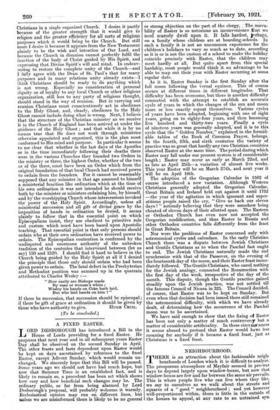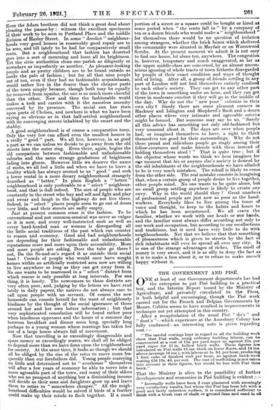NEIGHBOURHOOD. . T HERE is an attraction about the fashionable neigh-
bourhoods of London which it is difficult to analyze. The prosperous atmosphere of Mayfair seemed in pre-war days to depend largely upon window-boxes, but now that window-boxes are few and far between the same air prevails. This is where people live who can live where they like, we say to ourselves as we walk about the streets and squares of a " good " neighbourhood , and yet however well-proportioned within; there is little in the outside of the houses to appeal, at any rate to an untrained eye. Even the Adam brothers did not think a great deal about pleasing the passer-by : witness the excellent specimens of their work to be seen in Portland Place and the middle division of Harley Street. In some " derelict " neighbour- hoods very good houses in reasonably good repair are to be seen, and till lately to be had for comparatively small rents. But a neighbourhood that fashion has deserted goes into a sort of mourning and loses all its brightness. Yet the civic authorities clean one parish as diligently or nowadays as-imperfectly as another. • As pleasant-looking people and as pretty children are to be found outside as inside the pale of fashion; but for all that nine people out of ten, even if they had no fashionable acquaintance, would rather live in the dearer than the cheaper parts of the town simply because, though both may be equally far removed from squalor, the one is so much more cheerful than the other. Now and then the fashionable world makes a trek and carries with it the nameless amenity conveyed. by its presence. The social sun has risen upon parts of Chelsea, and nowhere is what we have been saying so obvious as in that half-settled neighbourhood with its converging streets inhabited by the smart and the shabby. A good neighbourhood is of course a comparative term. Only the very few can afford even the smallest houses in a really " good " part. We all live, however, in as good a part as we can unless we decide to go away from the old streets into the outer ring. Even there, again, begins the old comparison between fashionable and unfashionable suburbs and the same strange gradations of brightness fading into gloom. However little we deserve the name of snobs, we all feel a little sad when we have to leave a locality which has always seemed to us " good " and seek a lower rental in a more dreary neighbourhood strangely described as " better." In plain English a " better ' neighbourhood is only preferable to a select " neighbour- hood, and that is dull indeed. The sort of people who are constantly in the street who buy and sell and fight and play and swear and laugh in the highway do not live there. Indeed, in " select ' places people seem to go out of doors very little, and their streets are sadly empty. Just at present common sense is the fashion. To be conventional and not common-sensical was never so vulgar as it is now, and every well-instructed snob as well as every hard-headed man or woman is disregarding all the little social traditions of the past which run counter to reason aid economy. Good and bad neighbourhoods are depending for their fashionable and unfashionable reputations more and more upon their accessibility. More and more people are asking, Does the tube go there I not, Do the So-and-so's regard it as outside their social beat ? Crowds of people who would once have sought homes within an artificially restricted area now are willing to live anywhere so long as they can get away from it. No one wants to be marooned in a " select " district from which rescue is only possible at long intervals. For one thing, it is lonely. The newcomers to these districts are very often poor, and, judging by the letters we have read lately in daily papers, the natives do not always care to call upon people with no servant. Of course the new housewife can console herself for the want of neighbourly kindness by the thought of the social ignorance of those around her and her own better information ; but that very sophisticated consolation will be found rather poor when loneliness oppresses and the hours of a summer day between breakfast and dinner seem long, specially long perhaps to a young woman whose marriage has taken her out of a large house always full of movement. Now that travelling is so exceedingly disagreeable and spare money so exceedingly scarce, we shall all be obliged to depend more than we have done upon the neighbourhood for society. At the same time, it looks as though we should all be obliged by the rise of the rates to move more fre- quently than our forefathers did. Young people marrying on little and determined not to " overhouse themselves will after a few years of economy be able to move into a more agreeable part of the town, and many of their elders who see no prospect of anything but a diminishing income will decide as their sons and daughters grow up and leave them to retire to " somewhere cheaper." All the neigh- bourhood difficulties would be solved if birds of a feather could make up their minds to flock together. If a small portion of a street or a square could be bought or hired at some period when " the rents fall in" by a company of ten or a dozen friends who would. make a " neighbourhood " for themselves there would be no question of isolation among strangers, whether the brick boxes which sheltered the community were situated in Mayfair or on Wormwood Scrubs. At the present moment we admit it is not easy to find one house, let alone ten, anywhere. The congestion is, however, temporary and much exaggerated, so far as the upper middle-class are concerned, by an almost uncon- scious ignoring of whole tracts of town hitherto disregarded by people of their exact condition and ways of thought and of living. After all, a group of friends settling in any part of London will not find themselves entirely confined to each other's society. They can get to any other part of the town in something under an hour, and they can get there in moderate comfort if they will go in the middle of the day. Why do not the " new poor " colonize in their own city ? Surely there are some pleasant corners in Hackney and Islington and Shepherd's Bush and a dozen other places where very intimate and agreeable coteries might be formed. But someone may say to us, " Surely all this advice has something not only old-fashioned but very unsound about it. The days are over when people had, or imagined themselves to have, a right to think themselves too good for their surroundings. Why do not these proud. and ridiculous people go singly among their fellow-creatures and make friends with them instead of holding themselves aloof ? " That is quite true ; but if the objector whose words we think we hear imagines for os,e moment that his or anyone else's society is desired by the old inhabitants of the neighbourhoods we have alluded to he is very much mistaken. The rebuff is likely to coma from the other side. The real mistake consists in imagining that, when a certain group of people desire to live together, other people mind. No one wants to be quite alone, but no small group settling anywhere is likely to create any envy. Why in the world should they ? Great numbers of.professional people are just now as poor as the hand- workers. Everybody likes to live among the tones of voice and thought, to keep to the habits and hours to which he has been accustomed. . We all crave the familiar, whether we work with our heads or our hands, and the familiar must always differ according not only to our work and occupation, but according to our recollections and traditions, but it need have very little to do with neighbourhoods. Not that we believe that that something of pleasantness which is given to streets by the fact of rich inhabitants will ever be spread all over any city. It is one of the strange advantages of riches. The smell of money is very sweet, and it is as silly to deny the fact as it is to make a fuss about it, or to refuse to make oneself happy without it.



































 Previous page
Previous page